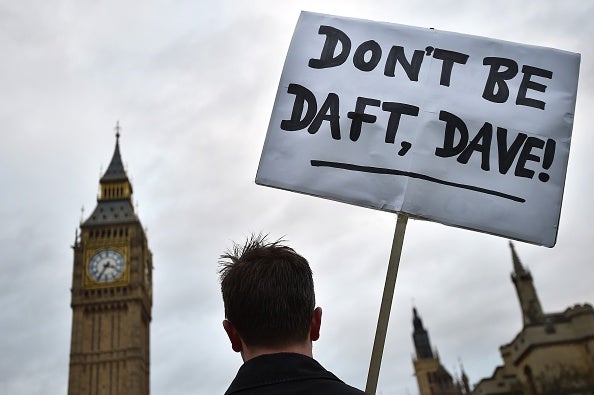Britons more opposed to Syria air strikes since Commons vote
More than half of Labour supporters now disapprove of the bombing campaign, compared to a quarter in November

Your support helps us to tell the story
From reproductive rights to climate change to Big Tech, The Independent is on the ground when the story is developing. Whether it's investigating the financials of Elon Musk's pro-Trump PAC or producing our latest documentary, 'The A Word', which shines a light on the American women fighting for reproductive rights, we know how important it is to parse out the facts from the messaging.
At such a critical moment in US history, we need reporters on the ground. Your donation allows us to keep sending journalists to speak to both sides of the story.
The Independent is trusted by Americans across the entire political spectrum. And unlike many other quality news outlets, we choose not to lock Americans out of our reporting and analysis with paywalls. We believe quality journalism should be available to everyone, paid for by those who can afford it.
Your support makes all the difference.Public support for air strikes in Syria is steadily dropping despite the Government's vote in favour of the measure, a poll has indicated.
Less than a week after MPs voted with a higher-than-expected majority to extend air strikes from Iraq into Syria, the YouGov survey showed public backing for the motion had dropped by 31 points.
Support had remained quite constant between mid September and 24 November, when around 58 to 60 per cent of the public were in favour of airborne raids on the war-torn country.
But by 3 December, only 44 per cent of Britons said they still agreed it was the right thing to do.
Labour supporters were most concerned about extending military action, with only 29 per cent in support of RAF air strikes the day after the Commons vote.
It is the sharpest drop among all the parties, with more than half of Labour supporters in favour when asked the same question earlier in November.
A total of 51 per cent of Labour voters said they now actively "disapproved", compared to a quarter who took that stance in November.
The results reflect paryy leader Jeremy Corbyn's staunch opposition to air strikes.
He has argued that the Labour supporters who overwhelmingly backed him in the party's leadership election do not want military striks, and has warned that British bombs will kill innocent people opposed to Isis if air strikes are extended.
In the Commons vote, 153 Labour MPs voted with their leader against bombing, while 66 defied him and voted with the Conservatives.
Jeremy Corbyn had allowed his MPs a free vote, rather than impose a three-line whip. Among Conservatives, 313 voted for the proposal and only 7 voted against military action.
During the debate, Mr Corbyn warned the Prime Minister that public opposition to his military plans was growing:
"The Prime Minister understands that public opinion is moving increasingly against [...] war. He wants to hold this vote before opinion against it grows even further," he told the Speaker.
Prime Minister David Cameron was criticised during the 11-hour debate after calling Mr Corbyn and shadow chancellor John McDonnell "terrorist sympathisers" in a private meeting.
Join our commenting forum
Join thought-provoking conversations, follow other Independent readers and see their replies
Comments